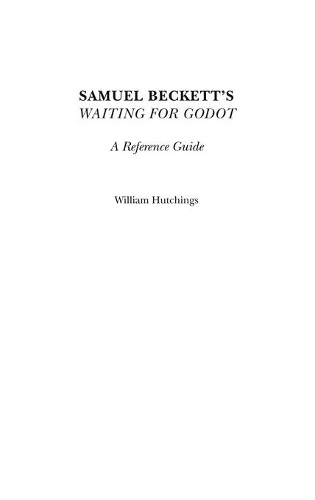
Samuel Beckett's Waiting for Godot: A Reference Guide
(Hardback)
Publishing Details
Samuel Beckett's Waiting for Godot: A Reference Guide
By (Author) William Hutchings
Bloomsbury Publishing PLC
Praeger Publishers Inc
30th May 2005
United States
Classifications
Professional and Scholarly
Non Fiction
Literary studies: c 1900 to c 2000
842.912
Physical Properties
Hardback
186
Width 156mm, Height 235mm
397g
Description
No modern play in the western dramatic tradition has provoked as much controversy or generated as much diversity of opinion as Samuel Beckett's Waiting for Godot. Since its initial production in 1953, it has revolutionized the stage through its ostensibly plotless form. It continues to be performed and is widely studied by school students, undergraduates, and scholars. This guide conveniently introduces the play and synthesizes the vast body of critical reactions to it. The initial chapters summarize the play and discuss its origins and editions. The guide then looks at the cultural, historical, and intellectual contexts surrounding Beckett's work. It then analyses Beckett's dramatic art and gives full coverage of the play's performance history. A concluding bibliographical essay surveys the growing body of scholarship on this important work.
Reviews
Hutchings places Waiting for Godot on a par with Oedipus Rex and Hamlet in terms of meaning: the three plays have inspired more puzzled arguments than most other dramatic works. Beckett's set is a lone tree, and his characters are only waiting--supposedly--for the central character, who never comes or communicates. The play's meaning, if it has any, has left many playgoers spellbound and confused others. First produced in 1953, the play has fascinated an audience drawn by Beckett's questions: Why are we here Are we alone in an uncaring universe What are we to do while we are here How can we know And, ultimately, what does it matter Though Hutchings provides no answers to these questions, he does provide an excellent guide to this complex and puzzling play. Recommended. Upper-division undergraduates through faculty. * Choice *
[P]rovides a summary of the play's plot, a description of the various texts and editions available, a discussion of the play's intellectual content, an essay on its meaning, and overview of its dramatic art, a history of its performance worldwide through 2004, and a bibliographic essay directing readers to further reading. * Reference & Research Book News *
Author Bio
William Hutchings is Professor of English at the University of Alabama, Birmingham.
